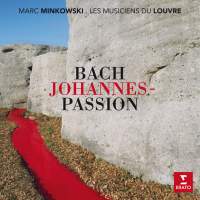Texte paru dans: / Appeared in: |
|
|
Outil de traduction ~ (Très approximatif) |
|
|
Reviewer: George
Chien
Marc Minkowski’s St. John
Passion, performed with a modest period-instruments ensemble and eight
hand-picked vocal soloists, represents the new normal for Passion
recordings, as opposed to that of Georg Christoph Biller, also discussed in
this issue, with the Thomanerchor Leipzig and the Gewandhausorchester.
Biller’s appears, on the surface, to be a throwback to older times. Except
for those two venerable institutions, it isn’t, but Minkowski’s version
nonetheless stands in striking contrast to it.
Both present the Passion as
the grand religious drama that it is, but Biller’s chorus and modern
instruments produce an essentially reverential ambience. Minkowski, who
writes in his note that it took him many years before he felt confident
enough to undertake the Saint John and get it right, creates a stark and
visceral narrative. The Passion story, after all, is one of betrayal and
cruelty, and Minkowski’s reading is intense, even operatic. But the Passion
is also a sermon of hope, and Minkowski also finds tenderness in the
contemplative numbers. Bach’s music is too rich and deep to be limited to
one, two, or many interpretations, so both Minkowski’s and Biller’s are
valid. Choosing between them is a matter of taste. Lothar Odinius is new to me, but his passionate Evangelist is compelling, as is Christian Immler’s Jesus. Minkowski is a Rifkinite, but flexible enough to engage ripieno singers where their presence is desirable. The result is the choral numbers are not as stark as is sometimes the case in other performances. I do question some of Minkowski’s tempos, which can be extreme. That aside, this is a tremendous achievement, one that I highly recommend. I was surprised to see that despite Minkowski’s obviously faster tempos the Erato set has a longer announced running time than Rondeau’s, until I realized that it’s because of the two bonus arias included in Minkowski’s discs. They are cleverly isolated from the actual Passion performance at the end of disc one by a half-minute silence, which gives the listener plenty of time to swap discs and bypass them. Good thinking! | |
|
Support us financially by purchasing this disc from eiher one of these suppliers. Un achat via l'un ou l'autre des fournisseurs proposés contribue à défrayer les coûts d'exploitation de ce site. |
|
|
|
|
|
Cliquez l'un ou l'autre
bouton pour découvrir bien d'autres critiques de CD |
|




